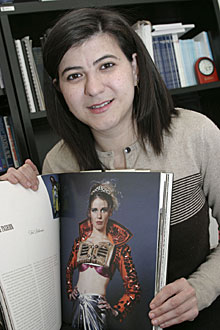Fashion is a big part of geography for Norma Rantisi

Norma Rantisi
Photo by Andrew Dobrowolskyj
Montrealers are renowned for being stylish dressers, but while many people share the city's enthusiasm for couture, Norma Rantisi, an assistant professor in the Department of Geography, Planning and Environment, is engaged in a deeper examination of Montreal's fashion world.
She calls the city "the centre of apparel and fashion within the Canadian context," but not just because of our ability to accessorize. Montreal is a fashion hub in other ways.
It has a long history of clothing design and manufacture, a large local retail and distribution market for clothes, and a significant institutional support network. All of these contribute to Montreal’s success both locally and abroad.
"What makes Montreal distinctive as well is its mixed identity, and the fact that it represents a taste of Europe in North America. This translates into a certain aesthetic quality about Montreal that is embedded in its products."
Rantisi is studying how and why fashion continues to thrive in Montreal. Prior to coming to Concordia, she did similar research about New York. She contends that the key aspect of the fashion industry that keeps it firmly rooted in cities is the design process.
"What interests me about the apparel industry is that despite common perceptions that it's an industry that's dying, it still has a base, it still has an anchor, in cities in particular."
She said that urban areas' varied and abundant artistic stimuli, and the supporting institutions in cities, like trade schools, professional associations and promotional events such as fashion shows, all ensure that designers tend to be located in urban centres.
The presence of designers ensures that much of the manufacturing of apparel stays in cities despite the fact it may be cheaper to manufacture clothing overseas. This is because designers and manufacturers often have to collaborate closely.
The fashion industry is very important for Montreal, Rantisi said. As well as contributing to the city's image as a stylish and exciting place, "it's one of those industries that provides jobs to new immigrants, women, groups that tend to be marginalized or closed off from other kinds of work."
Because of the benefits the industry brings to Montreal, and because of her own interest in both economic geography and urban planning, she will make policy recommendations to government and industry to ensure that Montreal's fashion industry continues to flourish.
Rantisi said that making such recommendations is an important part of her work. "As an urban planner, I want to act on a lot of my research — I don't want to just theorize about it."
She started teaching in 2002 in the Department of Geography, Planning and Environment. Its multidisciplinary approach makes it "the perfect place for me," serving her twin passions, geography and planning. "I wanted to be in a place that was open to both fields, and there aren't many."